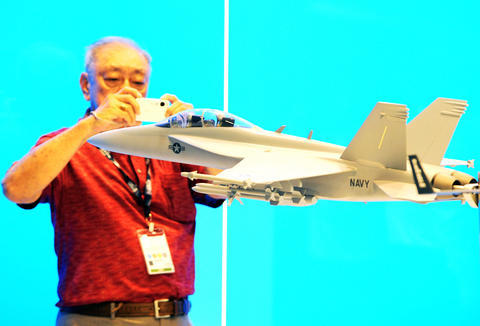The Singapore Airshow saw more than US$13.4 billion in sales of aircraft and related equipment this week, thanks to a booming aviation market, organizers have said.
Another US$2.6 billion was generated from contracts for facilities and other services, they said in a statement issued late on Friday, at the inaugural event.
The small but wealthy city-state decided to host its own airshow after organizers of the Asian Aerospace fair moved the event to Hong Kong.

PHOTO: AFP
The biggest deal that was announced at the airshow was an order for 56 Boeing 737-900ER aircraft worth more than US$4.4 billion by Indonesian low-cost carrier Lion Air.
Indonesian flag-carrier Garuda ordered four Boeing 777-300ERs worth US$1 billion and business jet operator BJets signed a US$600 million contract for 40 Cessna and Hawker jets.
US-based Boeing's European rival said it had secured orders for five A330-200F cargo planes from BOC Aviation, an aircraft leasing firm fully owned by Bank of China (
The deal is worth a total of US$877 million at catalog prices.
"The new deals announced at the airshow demonstrate once again that Asia is the world's fastest-growing aerospace market," said Jimmy Lau, managing director of the event's organizers.
He said 70 percent of the exhibitors have already confirmed bookings for the biennial event in 2010 being held at a new seaside location near Changi Airport.
Lau promised "an even bigger and better" show in 2010, saying this year's event already had 40 percent more exhibition area than Asian Aerospace which was last held in Singapore in 2006 and saw US$15.2 billion in deals.
More than 30,000 accredited industry professionals visited the airshow and numbers were expected to grow as opened to the public at the weekend.
Organizers have dubbed the Singapore Airshow as Asia's biggest aerospace event because it has civilian and defense components, while Asian Aerospace has focused on commercial aviation after its shift to Hong Kong.
More than 800 exhibitors from 42 countries, including US defense firms Lockheed Martin and Northrop Grumman, took part in the airshow that featured the latest warplanes, unmanned aerial vehicles and executive business jets.
"Asia is a vital market for us and it has been our constant endeavor to establish and strengthen our ties with this dynamic region," said Bernard Buisson, Singapore managing director for EADS, which owns Airbus.

SEEKING CLARITY: Washington should not adopt measures that create uncertainties for ‘existing semiconductor investments,’ TSMC said referring to its US$165 billion in the US Taiwan Semiconductor Manufacturing Co (TSMC, 台積電) told the US that any future tariffs on Taiwanese semiconductors could reduce demand for chips and derail its pledge to increase its investment in Arizona. “New import restrictions could jeopardize current US leadership in the competitive technology industry and create uncertainties for many committed semiconductor capital projects in the US, including TSMC Arizona’s significant investment plan in Phoenix,” the chipmaker wrote in a letter to the US Department of Commerce. TSMC issued the warning in response to a solicitation for comments by the department on a possible tariff on semiconductor imports by US President Donald Trump’s

The government has launched a three-pronged strategy to attract local and international talent, aiming to position Taiwan as a new global hub following Nvidia Corp’s announcement that it has chosen Taipei as the site of its Taiwan headquarters. Nvidia cofounder and CEO Jensen Huang (黃仁勳) on Monday last week announced during his keynote speech at the Computex trade show in Taipei that the Nvidia Constellation, the company’s planned Taiwan headquarters, would be located in the Beitou-Shilin Technology Park (北投士林科技園區) in Taipei. Huang’s decision to establish a base in Taiwan is “primarily due to Taiwan’s talent pool and its strength in the semiconductor

An earnings report from semiconductor giant and artificial intelligence (AI) bellwether Nvidia Corp takes center stage for Wall Street this week, as stocks hit a speed bump of worries over US federal deficits driving up Treasury yields. US equities pulled back last week after a torrid rally, as investors turned their attention to tax and spending legislation poised to swell the US government’s US$36 trillion in debt. Long-dated US Treasury yields rose amid the fiscal worries, with the 30-year yield topping 5 percent and hitting its highest level since late 2023. Stocks were dealt another blow on Friday when US President Donald

UNCERTAINTY: Investors remain worried that trade negotiations with Washington could go poorly, given Trump’s inconsistency on tariffs in his second term, experts said The consumer confidence index this month fell for a ninth consecutive month to its lowest level in 13 months, as global trade uncertainties and tariff risks cloud Taiwan’s economic outlook, a survey released yesterday by National Central University found. The biggest decline came from the timing for stock investments, which plunged 11.82 points to 26.82, underscoring bleak investor confidence, it said. “Although the TAIEX reclaimed the 21,000-point mark after the US and China agreed to bury the hatchet for 90 days, investors remain worried that the situation would turn sour later,” said Dachrahn Wu (吳大任), director of the university’s Research Center for